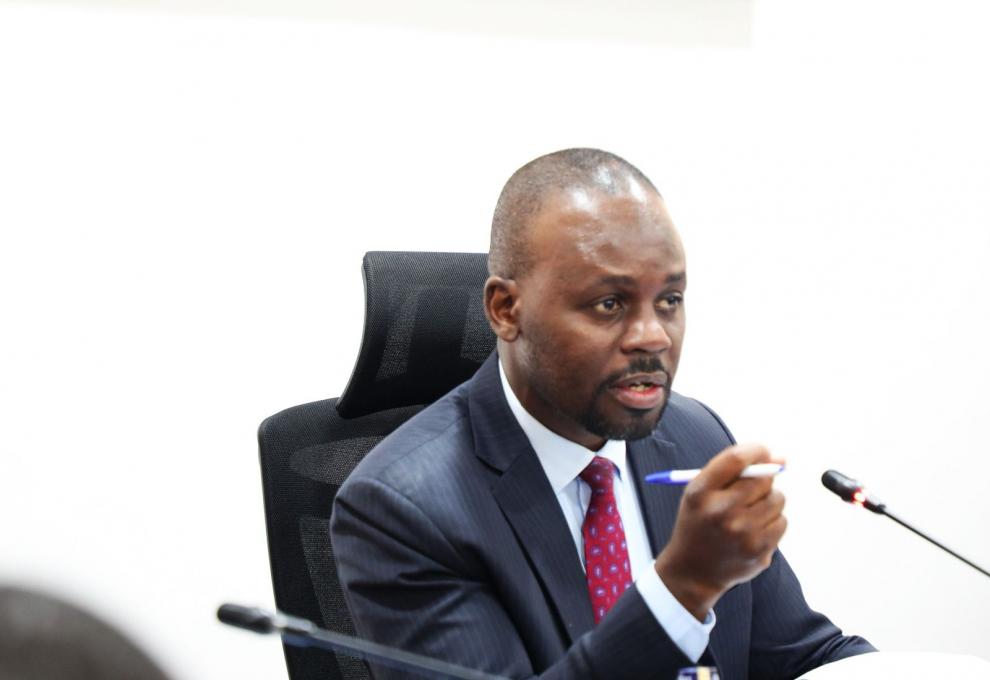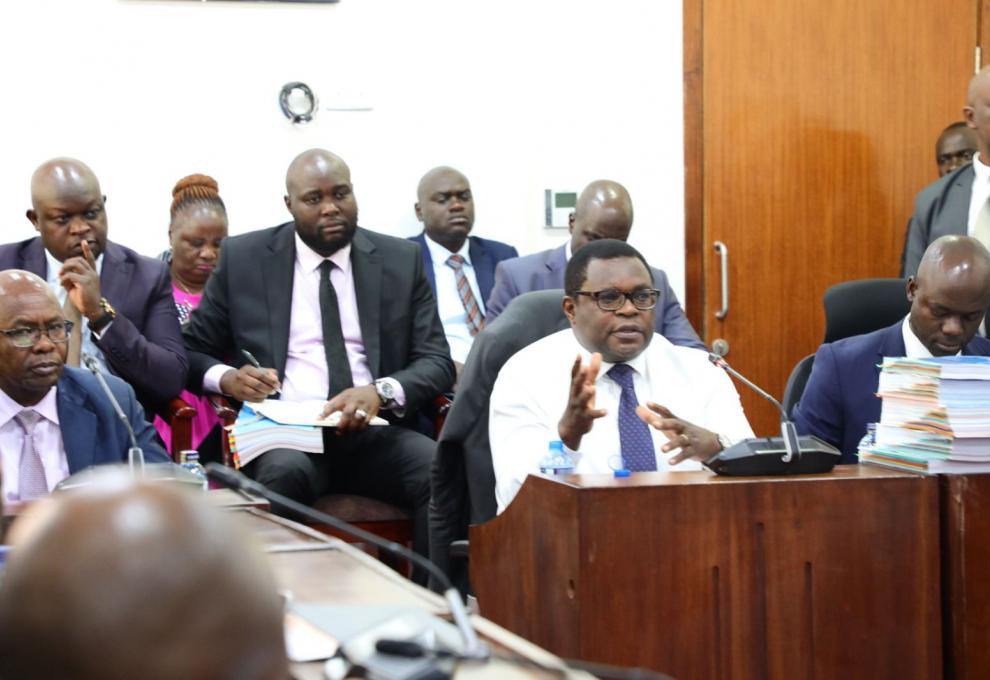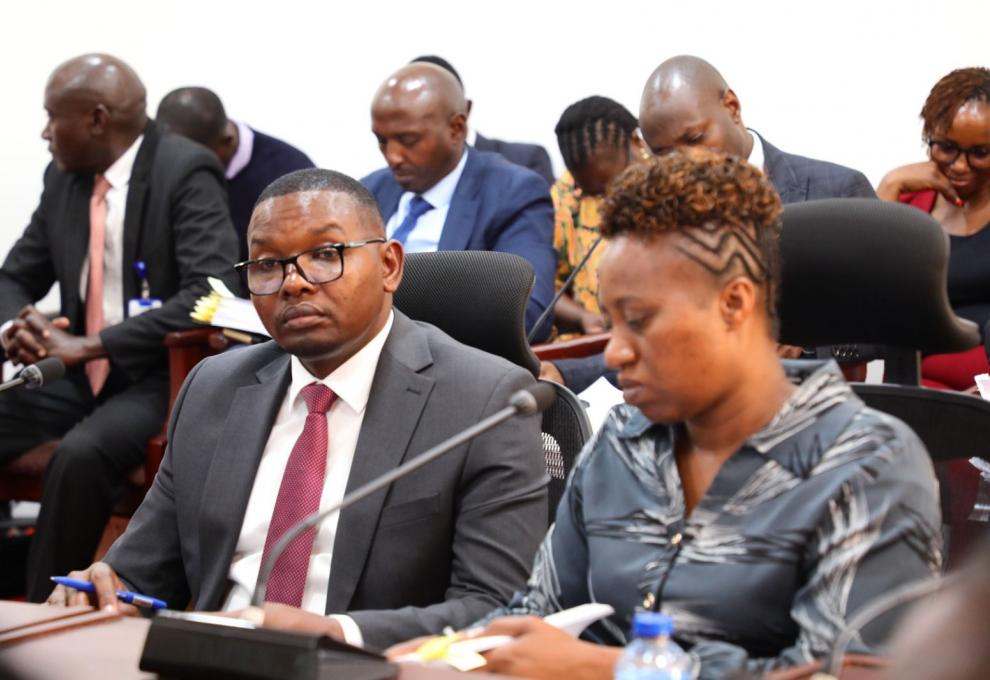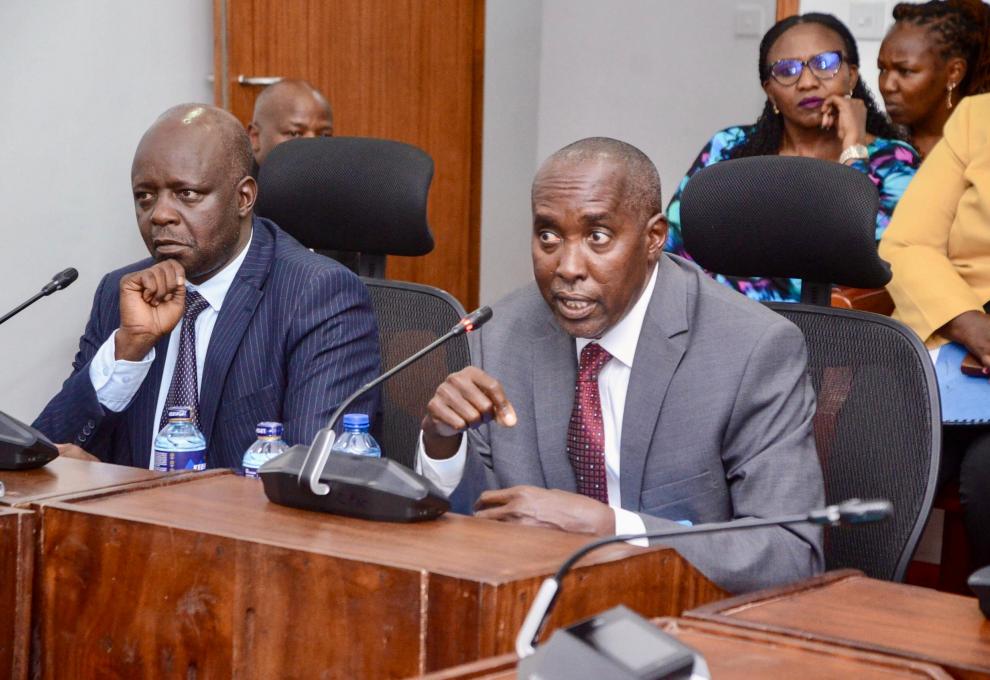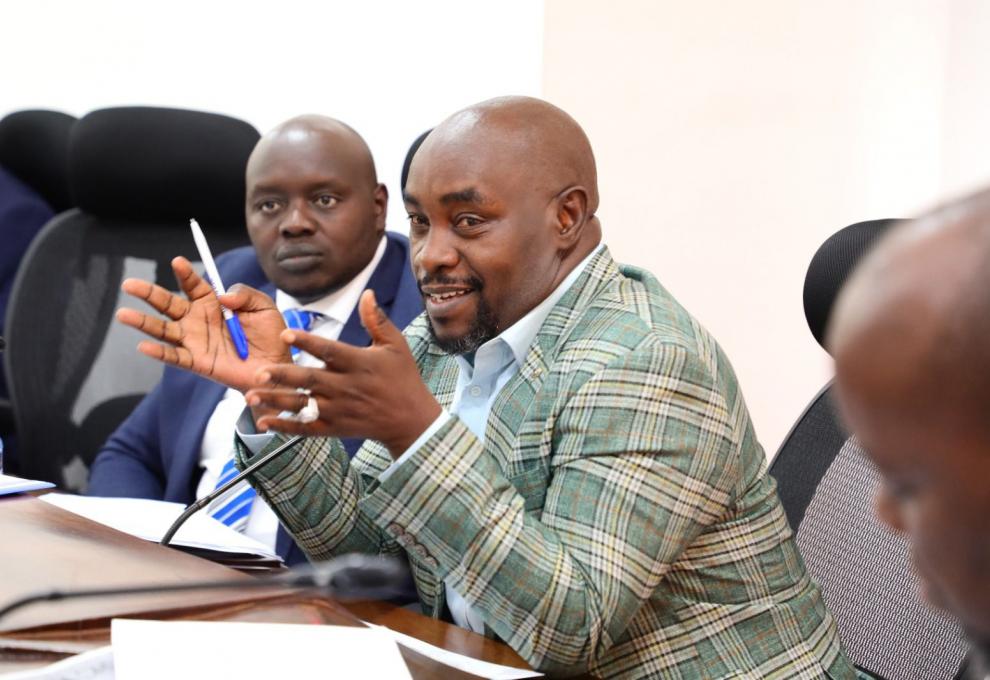𝐏𝐑𝐄𝐒𝐈𝐃𝐄𝐍𝐓 𝐑𝐔𝐓𝐎 𝐇𝐀𝐈𝐋𝐒 𝐏𝐀𝐑𝐋𝐈𝐀𝐌𝐄𝐍𝐓 𝐀𝐒 𝐀 𝐏𝐈𝐋𝐋𝐀𝐑 𝐎𝐅 𝐍𝐀𝐓𝐈𝐎𝐍𝐀𝐋 𝐏𝐑𝐎𝐆𝐑𝐄𝐒𝐒
President William Ruto has paid glowing tribute to Parliament for what he described as its immense contribution to Kenya’s progress over the past three years, affirming that the country’s achievements are the result of collective effort across all arms of government and the citizenry. Addressing the bicameral Parliament and by extension the entire nation, the President delivered a wide-ranging State of the Nation address that reviewed his administration’s record, acknowledged challenges and setbacks and set out a bold roadmap for future development.
In his remarks, President Ruto was unequivocal in his praise for legislators, attributing much of the progress registered since 2022 to their diligence and cooperation. “I express profound gratitude to the 13th Parliament for your outstanding contribution, your foresight, consistency, focus and commitment to what is good for Kenya. The progress made in the last three years would not have been possible without your legislative agility, principled oversight and commitment to the national interest,” he stated.
The President went on to add, “When the history of this generation is written, this House will occupy a full and proud chapter. Your decisions are recorded not only in debates or statutes, but in the lived progress of every Kenyan.” He extended his commendation beyond Parliament to the broader spectrum of national leadership and the Kenyan people, emphasising unity of purpose. “I say all this not as a personal badge of honour, but as a recognition of what we have achieved together, the Kenyan people, the leadership in all arms of government and across political formations,” he said.
𝐶ℎ𝑎𝑟𝑡𝑖𝑛𝑔 𝑡ℎ𝑟𝑒𝑒 𝑦𝑒𝑎𝑟𝑠 𝑜𝑓 𝑔𝑜𝑣𝑒𝑟𝑛𝑎𝑛𝑐𝑒
In reviewing his government’s performance, President Ruto asserted that his administration had honoured the promises it made upon assuming office, while remaining committed to delivering further reforms and development initiatives. Reflecting on the country’s journey, he said, “The long road we have travelled as a nation sixty-two years shaped by struggle, sacrifice, hardship, triumph and milestones has affirmed our spirit. We have made commendable progress, but Kenya still punches way below its true weight.”
Although acknowledging that the past three years have not been free of turbulence citing disagreements, compromise and storms that at times carried heavy costs, he insisted that his administration had nonetheless steered the nation toward stability and growth.
One example he highlighted was the successful effort to bring inflation under control. Inflation, which stood at 9.6 per cent in 2022 has steadily declined to 4.6 per cent as of last month. The President described this as a significant relief for households struggling with the high cost of living. He also pointed to the stability of the Kenyan shilling, which had been in a worrying downward spiral but has now steadied at Ksh129 to the US dollar for nearly two years. According to the President, this turnaround is a direct consequence of prudent monetary policy and disciplined fiscal management.
“This steep rise is no accident. It is the product of deliberate choices, disciplined execution and strategic reforms that have strengthened our economy and unlocked its potential,” he declared.
𝐵𝑜𝑜𝑠𝑡𝑖𝑛𝑔 𝑓𝑜𝑜𝑑 𝑠𝑒𝑐𝑢𝑟𝑖𝑡𝑦 𝑡ℎ𝑟𝑜𝑢𝑔ℎ 𝑝𝑟𝑜𝑑𝑢𝑐𝑡𝑖𝑜𝑛 𝑠𝑢𝑏𝑠𝑖𝑑𝑖𝑒𝑠
Turning to agriculture and food security, President Ruto emphasised the strategic decision his government made early on to subsidise production rather than consumption. He argued that this shift has significantly stabilised the agricultural sector and bolstered food security across the country.
A key plank of this strategy has been the fertiliser subsidy programme, through which more than 21 million bags of affordable fertiliser have been distributed to farmers nationwide. This intervention, he said has driven down the price of fertiliser by nearly two thirds, saving farmers an estimated Ksh105 billion.
The President outlined the direct impact of the programme, noting that national maize production has risen from 44 million bags in 2022 to 67 million bags in 2024, with projections indicating a historic harvest of 70 million bags this year. He also cited progress in other agricultural sub-sectors, including coffee, sugar, cotton, dairy and livestock, underscoring his administration’s commitment to reviving Kenya’s agricultural backbone.
𝑇𝑟𝑎𝑛𝑠𝑓𝑜𝑟𝑚𝑖𝑛𝑔 ℎ𝑒𝑎𝑙𝑡ℎ𝑐𝑎𝑟𝑒 𝑑𝑒𝑙𝑖𝑣𝑒𝑟𝑦
On healthcare, President Ruto described the sector as a top priority where significant reforms have already taken root. He highlighted the sharp rise in the number of Kenyans covered by the Social Health Authority (SHA), which now stands at 27 million more than three times the peak reached by the former National Hospital Insurance Fund (NHIF).
“This is a demonstration that leaving no one behind was and is not a slogan, it is a promise on course to fulfilment,” he said. He also pointed to the deployment of 107,000 Community Health Promoters in September 2023, calling it the largest primary healthcare workforce in Kenya’s history. These workers are trained, equipped and deployed to every ward in all 47 counties.
Dr Ruto further explained that his administration is modernising hospital equipment through the new National Equipment Service Project, replacing the Managed Equipment Service model that had burdened county governments with heavy upfront costs. Under the new fee-for-service system, private partners install, maintain and operate cutting-edge equipment, while public facilities pay only for what they use.
𝐸𝑑𝑢𝑐𝑎𝑡𝑖𝑜𝑛 𝑎𝑠 𝑡ℎ𝑒 𝑔𝑟𝑒𝑎𝑡 𝑒𝑞𝑢𝑎𝑙𝑖𝑠𝑒𝑟
In the education sector, President Ruto noted that one of his government’s earliest interventions was to restore education as the great equaliser. Through the Student Centred Funding Model which includes scholarships and loans, nearly 500,000 learners have already received support.
He also addressed the long-standing teacher shortage, revealing that his administration has hired 76,000 teachers to date, with an additional 24,000 set to be recruited by January 2026. “This will translate to 100,000 teachers in three years,” he said, describing the milestone as unprecedented in the country’s history.
𝐷𝑟𝑖𝑣𝑖𝑛𝑔 𝑎𝑓𝑓𝑜𝑟𝑑𝑎𝑏𝑙𝑒 ℎ𝑜𝑢𝑠𝑖𝑛𝑔 𝑎𝑛𝑑 𝑗𝑜𝑏 𝑐𝑟𝑒𝑎𝑡𝑖𝑜𝑛
On the government’s affordable housing agenda, President Ruto reaffirmed his commitment to delivering 230,000 low cost homes as part of a wider socioeconomic transformation initiative. He described the housing programme as a vital multiplier for the economy, especially for young people.
“This programme is far more than housing. It is a national empowerment engine creating jobs, formalising the informal sector, revitalising MSMEs, restoring our environment and building resilient communities,” he said. He added that the initiative advances equity, dignity and sustainable development, the very values anchored in Article 10 of our Constitution.
𝑇ℎ𝑒 𝑁𝑌𝑂𝑇𝐴 𝑝𝑟𝑜𝑔𝑟𝑎𝑚𝑚𝑒 𝑓𝑜𝑟 𝑦𝑜𝑢𝑡ℎ 𝑒𝑚𝑝𝑜𝑤𝑒𝑟𝑚𝑒𝑛𝑡
The President highlighted the National Youth Opportunities and Transformation Agenda (NYOTA) as a flagship youth empowerment initiative aimed at uplifting 820,000 unemployed young people. The programme includes apprenticeships, Recognition of Prior Learning (RPL), digital skills training, entrepreneurship grants and supported savings schemes.
Once fully implemented, NYOTA is expected to have placed 90,000 young people into work or enterprise, certified 20,000 across various skill areas, capitalised 110,000 businesses, matched the savings of 190,000 participants and empowered 600,000 youths to participate in government procurement under the Access to Government Procurement Opportunities (AGPO) scheme.
𝐼𝑛𝑓𝑟𝑎𝑠𝑡𝑟𝑢𝑐𝑡𝑢𝑟𝑒 𝑒𝑥𝑝𝑎𝑛𝑠𝑖𝑜𝑛
In the transport and logistics sector, President Ruto unveiled an extensive expansion plan. The Ministry of Roads and Transport, he said, has mapped out 2,500 kilometres of highways for dualling and a further 28,000 kilometres for tarmacking over the next decade.
He also outlined plans for large scale public-private partnerships to modernise the Jomo Kenyatta International Airport as well as the ports of Mombasa and Lamu. The government is also working to resolve longstanding challenges facing Kenya Airways by 2026.
Work is already under way on several key projects. The President announced that he will be launching the dualling of the 170-kilometre Rironi–Naivasha–Nakuru–Mau Summit road in the coming week, alongside the dualling of the 58-kilometre Rironi–Maai Mahiu–Naivasha stretch.
According to him, this infrastructure drive will also include extending the Standard Gauge Railway from Naivasha to Kisumu and eventually to Malaba, beginning in January 2026.
𝐹𝑖𝑛𝑎𝑛𝑐𝑖𝑛𝑔 𝑡ℎ𝑒 𝑛𝑎𝑡𝑖𝑜𝑛’𝑠 𝑏𝑖𝑔 𝑑𝑟𝑒𝑎𝑚𝑠
To fund infrastructure projects estimated to cost around Ksh5 trillion, the President stressed the need for innovative financing models. He emphasised the importance of optimising national revenues, leveraging national assets and creating public-private partnerships to tap into global and regional private sector resources.
He said the National Infrastructure Fund, supported by reforms in the Government-Owned Enterprises Bill passed by Parliament will provide a strategic framework to scale up investment. Alongside this, the government plans to establish the Sovereign Wealth Fund to promote intergenerational equity. The fund will be anchored on three pillars, savings, stabilisation and infrastructure and will draw part of its resources from royalties on natural resources and proceeds from the privatisation of national assets.
The President noted that he has engaged leaders across the political divide, including the late Raila Odinga and former President Uhuru Kenyatta, both of whom highlighted the importance of large scale investment in roads, energy and food security.
𝐴 𝑐𝑎𝑙𝑙 𝑡𝑜 𝑎𝑐𝑐𝑜𝑢𝑛𝑡𝑎𝑏𝑙𝑒 𝑙𝑒𝑎𝑑𝑒𝑟𝑠ℎ𝑖𝑝
In closing, President Ruto urged leaders to remain focused on delivering meaningful change. “Those of us in leadership must bear in mind one critical lesson, leaders are not ultimately judged by the visions they carry or the statements they make or the mantras they repeat, they are judged by the actions they take, the value they generate and the impact they make in the lives of the people.”
He concluded his address by submitting to Parliament three constitutionally required reports, the Report on All Measures Taken and Progress Achieved in the Realisation of National Values, the Report on Progress Made in Fulfilling the International Obligations of the Republic and the Report on the State of Security.
The joint sitting on Thursday was convened by the Speaker of the National Assembly Moses Wetang’ula and the Speaker of the Senate Amason Kingi.












